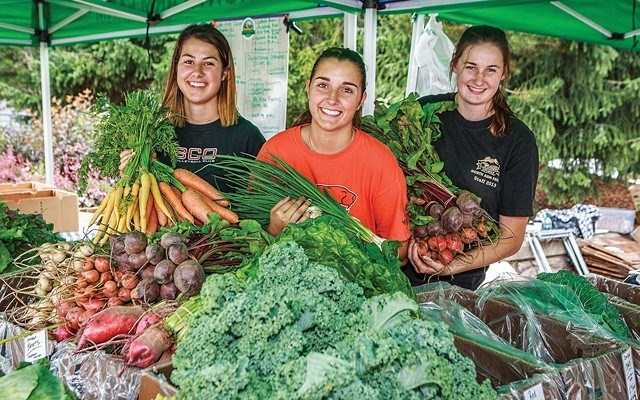The Whistler Centre for Sustainability (WCS) is raising money to implement several action items aimed at improving the region’s food system. Broadly defined, a food system includes all infrastructure and processes involved in feeding a population.
Cheeying Ho, executive director of the WCS, told Pique that the initiatives will support local farmers, promote healthy eating and an “understanding of where our food comes from."
The initiatives were developed by the Squamish Lillooet Regional Food Task Force, which began meeting in 2017. It is made up of a “diverse group of people from all aspects of food,” said Ho, noting that farmers, local government, and environmental organizations are represented.
"This is the first time a regional task force has gotten together to look at food and sustainability," said Ho. "The task force includes people from all local governments, except for Lillooet.”
Ho said the task force, which met four times, produced a healthy dialogue. "People were really interested in sharing with each other what they're doing around food,” she said.
The stakeholders also discussed various “gaps” in the region’s food system and “actions that can be done on a regional scale to move forward food sustainability," explained Ho.
The task force has developed eight initiatives it hopes to tackle:
- Design or redesign an educational resource for realtors and newcomers who are considering purchasing Agricultural Land Reserve (ALR) or non-ALR farmland in any of the regional communities
- Identify and support an individual to be a Sea to Sky regional representative to the Small-Scale Meat Producers’ Association
- Create a regional online food hub that hosts inventory of local producers that anyone can buy and develop ways to transport it to buyers
- Develop a food literacy initiative that describes what nutritious food $20 can purchase
- Work with local schools to improve food literacy and cooking skills
- Promote sustainable food packaging
- Develop and implement a policy and education program to divert all organic waste from landfill
- Design and develop a regional food procurement policy that can be adopted by local municipalities and businesses that would support local farmers
To finance the projects, the WCS has secured a $58,000 grant from the Vancouver Foundation to be paid over two years.
However, it requires matching funds to proceed with the grant agreement, and is aiming to raise $29,000 this year.
So far the WCS has secured $5,000 in monetary funding ($2,000 from Resort Municipality of Whistler and $3,000 from Whistler Blackcomb Foundation) as well as about $8,000 in in-kind matching.
The funding will be used to provide micro-grants to partners, such as the Squamish Food Policy Council, the Association of Whistler Area Residents for the Environment (AWARE), and the Lillooet Agricultural Food Society. "Hopefully, we will be able to provide some funding back to these organizations to help them implement these actions,” said Ho.
The stakeholders will meet two-to-three times a year in order to update each other on their progress, said Ho.
To contribute or learn more, contact Cheeying Ho at cho@whistlercentre.ca.




